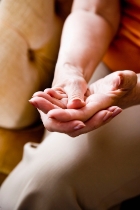More than 670,000 New Zealanders are affected by arthritis. Arthritis is the single biggest cause of disability in the country. A 2018 report1 states that arthritis cost the economy $12,2 billion a year, broken down in health sector costs, loss of wellbeing costs and other financial costs.
 What is Arthritis?
What is Arthritis?
The word arthritis literally means joint inflammation, and refers to a group of more than 140 different types of arthritis which can cause pain, stiffness, and swelling in the joints.
These diseases may affect not only the joints but also other parts of the body, including important supporting structures such as muscles, bones, tendons, and ligaments, as well as some internal organs2. They affect all ages and races, but in an unfair twist of fate, women tend to get arthritis more than men. There is no known cure.
Different Types of Arthritis
Of all the different types, the most common is Osteoarthritis which affects almost half of all those aged over 60 and virtually all those aged over 80.
Rheumatoid Arthritis can be the most crippling form of the disease.
Osteoarthritis
Linked with the wear and tear of our bodies as we age, it is regarded as a degenerative arthritis. It results from the mechanical breakdown in the cartilage structures governing the joints, most often in the large weight-bearing ones like knees, hips and spine, but also in the hands and big toe.
Other forms of arthritis include Rheumatoid Arthritis, Ankylosing Spondylitis, Fibromyalgia, Gout, Lupus, Scleroderma, Reactive Arthritis, Psoriatic Arthritis and Polymyalgia Rheumatica.
Symptoms
Osteoarthritis is a slow disease that can take many years to develop.
One of the first signs of Osteoarthritis is feeling a bit stiff when getting up from a chair. You may notice it takes a few steps to get going or notice the swelling of a particular joint compared to for instance the other knee. Over time, it becomes increasingly painful to move using that part of your body.
Reference:








health clues - 9 years ago
IN SHORT..Research into medications to treat arthritis is ongoing, there’s no current cure for this condition. Still, a healthy diet, proper rest, stress management, and regular exercise (physiotherapy) can help improve your quality of life. Over-the-counter medications and complementary treatments can also help to relieve pain and reduce inflammation. And disease-modifying drugs can ease symptoms, prevent joint damage, or help put RA in remission.